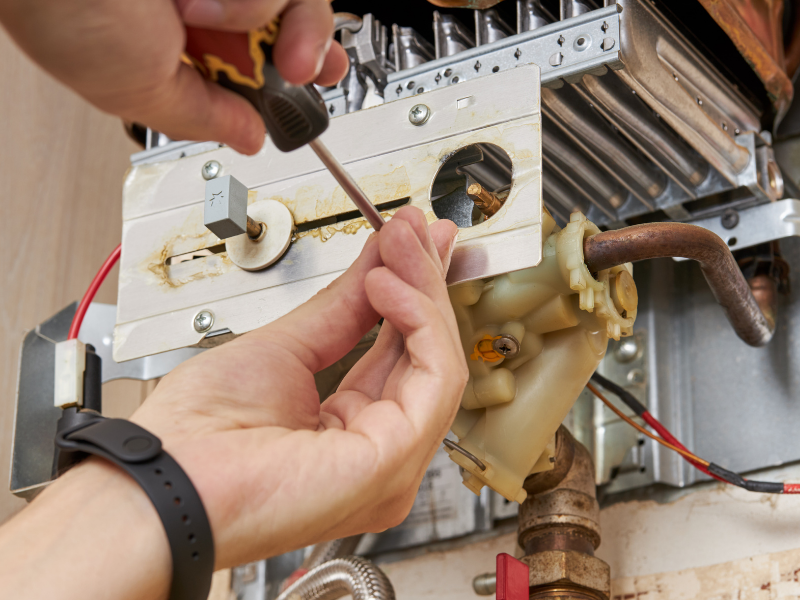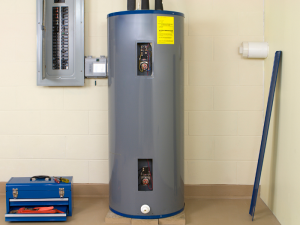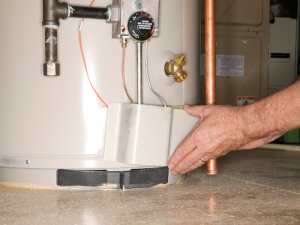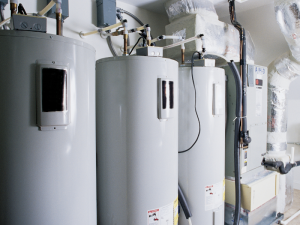Sometimes our water heaters can begin to put out too much hot water. This can happen for many different reasons, ranging from a thermostat being incorrectly adjusted to an interior component of your water heater developing an issue.
Is your water heater too hot? Whatever the problem may be, we will give you some information on how to fix your water heater throughout this article from Clover Contracting.
How does a water heater work?
Electric: An electric water heater will allow cold water to enter the water heater through a pipe on top of the unit and flow out of the line into the bottom of the water heater. You will have one or two heating elements inserted into the water heater tank from the side that heats the water. These elements will turn on when the water heater tank gets below the set temperature. Once the water is heated, it is pushed through the other pipe to your faucet.
Gas: Gas water heaters will work very similarly in their operation, which means that the cold water entering and the hot water exiting will work the same way. However, the difference will be that the gas water heater does not use heating elements. It uses a gas burner assembly. A thermostat device will also control it, but it will be integrated into the gas valve. Once the temperature drops below a designated heat level, the gas valve turns the valve on, the burners light underneath your water tank, and the water is heated.
Why is my hot water heater too hot?
You may be wondering, “why is my hot water heater getting too hot?”. When your water heater is too hot, you have a problem with your water heater. It may be something as simple as someone adjusting your thermostat too high during the winter, and now that it is warmer outside and your water lines don’t have as much cold weather against them, the water seems warmer.
Or it could be something much more severe such as a faulty thermostat, element, or gas valve. Any of these things can make your water heater too hot, and if the temperature gets too high, it could cause the water heater to begin leaking or, in the most extreme cases, could cause it to explode.
Malfunctioning thermostat
A malfunctioning thermostat could happen on either a gas or an electric water heater, as they both have them. Although, they will work quite differently depending on what type of water heater you have.
Electric: On a traditional electric water heater, you will have a thermostat for each heating element. Most standard water heaters will be equipped with two heating elements.
Before accessing any device’s electrical regions, you should be sure that the electricity connection has been shut off to the piece of equipment.
If you look at your electric water heater, you will see that it has two covers screwed to its side. If you take these two covers off, you will be met with a flap of insulation. Lift the insulation, and you will typically see a piece of plastic covering your thermostat. There will be two holes in the plastic, one with a button behind it and one with a turn dial.
The button will be the reset button, and the dial will be your temperature adjustment. A little arrow pointing to a number outside the dial will tell you what temperature the water heater is set. A water heater is commonly set between 120 and 140 from the factory, but it’s recommended to put around 120. Anything above 120 degrees can make your water heater too hot.
If your water heater is set at or above 140, you will need to adjust the temperature to a lower setting and then do the same to the other thermostat for your water heater. This is as easy as turning the knob counterclockwise until it points to the desired temperature.
Gas: On your gas water heater, you will see the gas valve towards the bottom of the water heater. It will be a silver square with a gas line connected to it and will typically have a dial on the front and at least one button on the top. The buttons on top are generally used for lighting your pilot and will not need to be messed with at this time.
The big dial on the front of the gas valve is what you want to concern yourself with. It is common for gas water heaters to not use temperatures for their dials but letters or sometimes words.
Usually, it will be A, B, C, D, or Warm, Hot, Very Hot. If you still have it, you should refer to your user manual to find out what temperature range each of these is. Otherwise, if it is one of the higher settings, you can turn it down one notch and see if that helps answer the question, “why is my hot water heater getting too hot?”
Mineral buildup
If you live in an area with hard water, you will likely have a sediment problem in your water heater. This will mean that the sediment will settle in your water heater, some of which will even get past a water filter. As it clings to the sides and the elements, it causes your water heater to work harder to heat the water.
Gas water heaters do not gather as much sediment due to the heat level. But that does not mean that it isn’t a concern. If the sediment builds up on the bottom of the tank, it can make the water heater too hot as it is trying to heat the water through the sediment build-up.
Faulty heating element
If the elements get covered with sediment, they will have to heat themselves for more extended periods to achieve the same goal. This can cause a malfunction in the element, leaving it stuck in the heating position, but it could also cause the elements to malfunction and begin heating the water beyond the designed purpose.
Extra information
Your pressure relief or pop-off valve will generally not cause your water to overheat, but it is a vital safety mechanism. If your water heater is overheating, then it is the purpose of the pressure relief valve to relieve the pressure before your water heater explodes. It is a good idea to check the function of this valve regularly to ensure that it is working correctly.
If hard water is a problem where you live, and you want to avoid having some of these issues, then the best thing you will be able to do is to flush your water heater.
This will flush all of the loose sediment out and help prolong the life of your elements and water heater as a whole. It will also help your water heater keep from making those popping sounds.
If you’re still wondering, “why is my water heater getting too hot?”, don’t hesitate to call a professional.
Sometimes you will be able to repair the problem yourself, but sometimes you need a little extra help — that’s when you can rely on the professionals.








